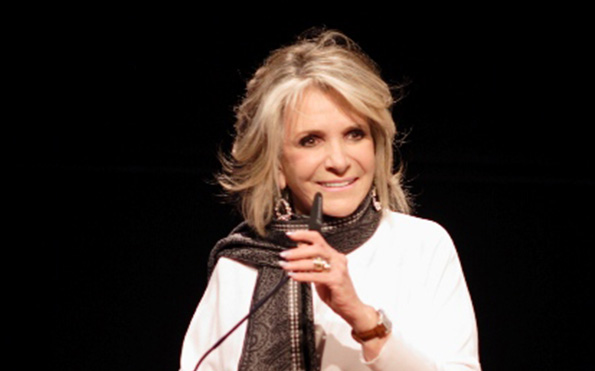 After listening to Sheila Nevins speak for even five minutes, it’s not hard to understand why she’s so successful in the documentary world. She is, in a word, frank, but also gifted with the kind of wit and wry delivery that lends her instant credence—a perfect balance between fact and craft, which is a hallmark of good nonfiction filmmaking. Her inherent knack for the genre is also apparent in her impressive resume: an HBO executive since 1979 and the president of HBO Documentary Films since 2005, Nevins has produced hundreds of titles and garnered dozens of honors, including 10 Academy Awards, 23 Primetime Emmys, 18 Peabody Awards for HBO, and even one for herself.
After listening to Sheila Nevins speak for even five minutes, it’s not hard to understand why she’s so successful in the documentary world. She is, in a word, frank, but also gifted with the kind of wit and wry delivery that lends her instant credence—a perfect balance between fact and craft, which is a hallmark of good nonfiction filmmaking. Her inherent knack for the genre is also apparent in her impressive resume: an HBO executive since 1979 and the president of HBO Documentary Films since 2005, Nevins has produced hundreds of titles and garnered dozens of honors, including 10 Academy Awards, 23 Primetime Emmys, 18 Peabody Awards for HBO, and even one for herself.
This career success seemed to be a primary focus of the recent Athena Center “Power Talk” with Nevins at Barnard College, her alma mater. As Barnard president Debora Spar put forth in her first question, “How did you get where you are today?”–the implication being, of course, “How might our bright, empowered women’s college graduates follow in your footsteps?” Nevins, however, seemed hesitant to offer her story as a prescriptive path to fame and fortune. Instead, she championed instinct and, above all, “resilience”–that there are no secret codes, no quick tips, and none of us is entitled to success, no matter how bright. As Nevins asserted early on, “It’s a great career, but I earned it.”
Indeed, Nevins’s narrative was remarkable, not only for its particular plot–from a stumbled-upon acting opportunity to producing television to climbing the ranks at HBO–but for its in-the-trenches candor. At no point did she sugarcoat the challenges of working in film, from the impossible and ever-changing hours to the implications of those hours on familial relationships. The film business, to hear her tell it, is “ruthless and torrid,” and leaves no space for a life outside. When Spar inevitably prodded at the issue of women in film (or, rather, the dearth thereof), Nevins’s initial tongue-in-cheek response was, “Women are too smart”–that we know better than to subject ourselves to that kind of grind.
However, as she was also quick to point out, this brutal reality may be shifting, if subtly, with the rise of new technologies. Whereas mere years ago, producing a documentary meant hours spent sitting in an editing studio, now rough cuts can be made available remotely with a touch of an iPad. As even professional women are often still expected to run households and provide childcare (and, honestly, as no one wants to spend that much of their time cooped up in a dark room staring at a screen), these increasingly portable methods of production might mean more opportunities for women in film–or, at least, slightly less time spent grappling with the dilemma of trying to “have it all.”
Because, as has been explored time and time again, women still face manifest challenges throughout the film business–even powerhouses like Nevins. Though her career is remarkable and her achievements many, she explained that there were times at which she “self-limited” in the interest of staying afloat. For example, when asked by her boss if she wanted to be President of HBO in its entirety, Nevins “thought ‘yes’ and said ‘no.’ That’s how I survived.”
And survived she has–thrived, even. Towards the end of the discussion, when a woman who brought her two young daughters to sit in the front row asked about the potential upsides of her age, Nevins countered, “What, you mean like wisdom?” with mock incredulity. Still, despite this resistance to dole out pat answers, it wasn’t difficult to glean inspiration from her stories–even, indeed, some wisdom. To pluck a favorite of the aphorisms she offered: “When you’re wrong, you have to figure out why. Because you will be wrong–but you must be right more often.”
Ultimately, it seems that, for those of us still interested in entering this torrid industry, success means staying sharp, canny, and ruthlessly practical. With any luck–along with technological advancement, and the example of pioneers like Sheila Nevins–when asked if we want to run the town, this next generation of female broadcasters may well be able to think “yes,” and say it, too.







